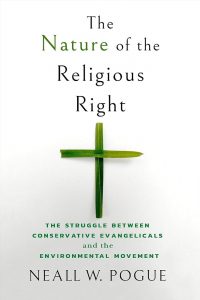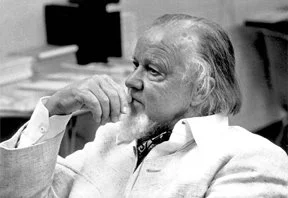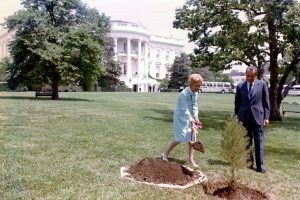Rising temperatures made 2023 earth’s hottest year on record. Climate scientists say human activity increases heat-trapping gasses that contribute to weather-related disasters, which in 2022 forced more than 3 million Americans from their homes and cost the world $360 billion in damages.
But most evangelical Christians largely reject this scientific consensus, making their tribe the least likely to see climate change as a problem, according to Pew and PRRI. Many evangelical leaders use their influence to oppose climate-friendly legislation.
Historians of “evangelical environmentalism” wanted to know: Why are evangelicals firm climate change denialists? Has that always been the case?
They were shocked by what they found. Evangelicals largely supported “environmental stewardship” during the 1970s and 1980s, arguing that Christians who love God should also love and take care of God’s creation.
Southern Baptist pastors were among those who preached pro-environmental sermons, their mission agencies reduced energy consumption and members proclaimed their commitment to caring for God’s green earth.

Richard Land
As late as 1991, Richard Land and the SBC’s Christian Life Commission acknowledged that “humans are changing the earth” and causing temperatures to rise. Land urged fellow Baptists to get on board going beyond environmental concern to environmental action.
But within a few years, Land and the SBC would reverse course, joining their evangelical brethren in dismissing claims of global warming, condemning environmentalism as a pagan cult, and using their influence to oppose climate-friendly legislation.
Merger with the pro-business Republican Party
In the 1990s, evangelical leaders merged the Religious Right with the Republican Party and baptized its big business worldview. They used their broadcasting and publishing platforms to amplify the fossil fuel lobby’s strategy: “Reposition global warming as a theory rather than fact,” following a model tobacco companies used to battle evidence that nicotine causes cancer.
 Neall Pogue spent years visiting dusty archives to document the rapid reversal he describes in his book, The Nature of the Religious Right: The Struggle Between Conservative Evangelicals and the Environmental Movement. “One of the most effective arguments accused secular environmentalists of being earth worshipping extremists and participants in a conspiracy to promote New Age religions and a one world government that would destroy American capitalism,” he wrote.
Neall Pogue spent years visiting dusty archives to document the rapid reversal he describes in his book, The Nature of the Religious Right: The Struggle Between Conservative Evangelicals and the Environmental Movement. “One of the most effective arguments accused secular environmentalists of being earth worshipping extremists and participants in a conspiracy to promote New Age religions and a one world government that would destroy American capitalism,” he wrote.
Illustrations help tell the story.
In 1986, conservative homeschooling publisher Abeka released an elementary school reader that featured a story praising naturalist and Sierra Club founder John Muir, accompanied by art showing a young John hugging a tree: “More than any other man of his time, John Muir battled for the preservation of our forests and the development of national parks. His attempt to have the government set aside beautiful areas has saved, for all of us to enjoy, some of the loveliest places in America. Because of John Muir, millions of Americans have been able to see the beauty God gave to our country.”
By 1993, Muir was out and anti-environmental messages were in Abeka’s curriculum:
- “There has been no global warming”
- “Studies indicate that acid rain has existed for 350 years”
- “Scientists generally agree that a rise in atmospheric carbon dioxide would result in a substantial increase in plant productivity”
Abeka reinforced the point with a poem:
Roses are red, violets are blue
They both go better with more CO2.
Likewise, Robin Globus Veldman’s The Gospel of Climate Skepticism shows how “leaders in the politicized arm of the evangelical tradition” fell in line with the “climate denial machine” and used their platforms to convince believers that anti-environmentalism is the natural, normal and Christian view.
More reversals
This shift to climate denialism was a major reversal from evangelicalism’s earlier support of creation stewardship.

Francis Sheaffer
Francis Schaeffer encouraged evangelicals to fight abortion in his 1979 book and film, Whatever Happened to the Human Race? That was long after he challenged evangelicals to practice a biblically based environmentalism in Pollution and the Death of Man, published in January 1970, three months before the first Earth Day.
Schaeffer said he said he loved ants and trees for the same reasons he fought for unborn babies. “I do not do it for the practical or pragmatic results; I do it because it is right and because God is the Maker,” he wrote.
Schaeffer said Christians should be more committed to creation care than people unaware of the natural world’s divine origins: “Christians, of all people, should not be the destroyers. … We should treat nature with an overwhelming respect. … Man was given dominion over creation. But since the Fall man has exercised this dominion wrongly due to his ‘greed and haste.’”
“We are living in and practicing a sub-Christianity,” he wrote, and the church is passing up an opportunity to evangelize people who care about the environment. “They have seen that most Christians simply do not care about nature as such.”

In 1970, Richard and Pat Nixon plant a tree on the White House lawn to commemorate the first Earth Day. (White House Photo Office)
When the first Earth Day arrived on April 22, 1970, many evangelical Christian leaders already were on board with protecting God’s creation.
Three days later, the Billy Graham Evangelistic Association’s “Hour of Decision” radio show featured a sermon by Leighton Ford titled, “Good Earth or Polluted Planet?” The choir sang the hymn “For the Beauty of the Earth.”
Graham’s Decision magazine echoed Ford’s sermon with “The Defilement of the Earth,” an editorial by Sherwood E. Wirt. Evangelism is still job No. 1, he wrote. “Let’s not foul the environment while we do it.”
The National Association of Evangelicals was an early and ardent supporter of environmental care. At its 1971 convention NAE passed resolutions condemning homosexuality and abortion along with another resolution pledging to protect the environment.
Twenty years after the first Earth Day, NAE dedicated an issue of its magazine, United Evangelical Action, to environmental stewardship. NAE would continue to support the cause into the 1990s, even as some of its more politically active members began promoting their new anti-environmental gospel.
Harold Lindsell, an editor at Christianity Today from 1968 to 1976, represented two strains of evangelical environmentalism.
First, he acknowledged humans had degraded their God-given home: “We have exploited and raped nature (and) if we continue at the rate we are going, the planet will shortly be uninhabitable.”
Second, he was a pioneer in describing parts of the environmental movement as an earth worshipping pantheistic cult, which CT warned against in a 1970 editorial titled “Ecologism: A New Paganism.”
In the 1990s, conservative Christian groups used claims about a pagan environmental cult (and its heretical Christian supporters) as part of a strategy to line up voters behind the GOP’s pro-business, anti-environmental agenda.

Neal Pogue
Both Pogue and Veldman document the ways conservative evangelical leaders — Pat Robertson, Jerry Falwell, Chuck Colson, Tony Perkins of Family Research Council, and the CBN network — promoted their gospel of climate skepticism.
“These conspiracy theories were delivered with a strong dose of ridicule aimed at belittling anyone expressing sympathy for the natural world,” Pogue wrote. “Such a strategy indirectly vilified Christian environmental stewardship through guilt by association.”
The Baptist record
Some Baptists abandoned environmentalism early. In 1973, future SBC President Adrian Rogers preached a sermon at Bellevue Baptist Church in Memphis on “Theology of Ecology.” But by 1984, Rogers was aligned with the Reconstructionist group Coalition for Revival, which issued a resolution, “The Christian World View of Economics,” that placed financial issues above environmental concerns.
Other Southern Baptists held on to their pro-environmental views a while longer before abandoning and eventually repudiating them.
Three-and-a-half years after the first Earth Day, America was in its first energy crisis. Arab nations halted shipments of oil to the U.S. over America’s support for Israel, leading to gas shortages that overnight made conservation essential.
W.A. Criswell’s First Baptist Church in Dallas implemented energy-saving policies in its buildings and encouraged members to carpool to services to save gas. Jerry Falwell’s Thomas Road Baptist Church reduced social outings and youth group trips and reduced its bus ministry. Even fundamentalist First Baptist Church of Hammond, Ind., reduced its fleet of buses.
The SBC Home Mission Board launched a recycling program that saved nearly 150 trees and 2,000 gallons of fuel in months. Colleges got involved, too. Missouri Baptist University organized a cleanup event on campus. Students at Houston Baptist University worked with city officials to combat litter and pollution.
Texas Baptists said energy conservation was more than an economic issue, it was “a moral and spiritual matter.” Baptists in North Carolina said wasting energy was not only poor stewardship but also a sin.
In 1971, the first anniversary of Earth Day, the SBC conducted a poll of 312 pastors and 375 Sunday school teachers to gauge their eco-friendliness: 82% of pastors and 76% of Sunday school teachers agreed that “a local Southern Baptist church should ‘lead church members to involve themselves and cooperate actively with authorities’ in attempts to solve air and water pollution problems.”
Southern Baptists followed the rest of the evangelical world in the great reversal.
Southern Baptists followed the rest of the evangelical world in the great reversal, however.
In 2007, Pew surveyed Southern Baptist church members, finding 35% agreed with the statement, “Stricter environmental laws and regulations cost too many jobs and hurt the economy.” By 2014, 50% of Southern Baptists agreed that environmental regulations hurt more than they help.
As Southern Baptists and other evangelicals changed their tune, they disabled the movement toward creation care. “Anti-environmentalist positions from political conservatives eventually crushed calls for environmental action,” Pogue explained.
Richard Land as a case study
In the 1990s, as conservatives gained full control of the SBC and its institutions, Richard Land held great national influence as head of the Christian Life Commission (now known as the Ethics and Religious Liberty Commission).
In 1991, Land organized a CLC event designed to spur Baptists to embrace a more active environmental response to global warming. He was inspired, in part, by Francis Schaeffer, who called evangelicals to practice a biblically based environmentalism in Pollution and the Death of Man, published in January 1970.
Land lined up an impressive roster of SBC leaders to speak at the CLC event, including SBC President Morris Chapman, Russell Bush of Southeastern Baptist Theological Seminary, Gary Leaser of the Home Mission Board, and Prestonwood Baptist Church Pastor Jack Graham.
Land created a fact sheet for the event titled “Endangered Earth” that made things crystal clear: “HUMANS ARE CHANGING THE EARTH.” The fact sheet acknowledged the scientific consensus — that temperatures are rising because human activities are increasing carbon dioxide, methane and other gasses — and cited articles from Scientific American, Time magazine, the Washington Post and other secular sources.
But within a few years, Land reversed himself, denying that humans are causing global warming.
“Conservative evangelicals including Land abandoned Christian environmental stewardship out of fear they would be associated with a variety of conspiracy theories combined with the potential threat of being ridiculed by fellow evangelicals,” Pogue wrote. “By 2000, it was apparent that he had bowed to Christian climate change deniers and stepped in line with his politically conservative peers.”
Soon, Southern Baptist leaders quit promoting a biblical understanding of Christian environmentalism and began teaching that environmentalism is inherently anti-Christian and that environmental legislation is silly, harmful and costly.
Jerry Falwell — who at this point was warming to the SBC and ready to abandon his independent Baptist heritage — preached about “THE MYTH OF GLOBAL WARMING” at Thomas Road Baptist Church, where Associate Pastor Elmer Towns told members he hoped a winter snowstorm would clobber the Northeast, home to those elitists who still believed in global warming.
When Pogue interviewed Land about this shift in 2017, Land blamed it on pagan environmentalists, saying things could have gone down “a very different path had environmentalists not gone completely wacko …, which they did.”


